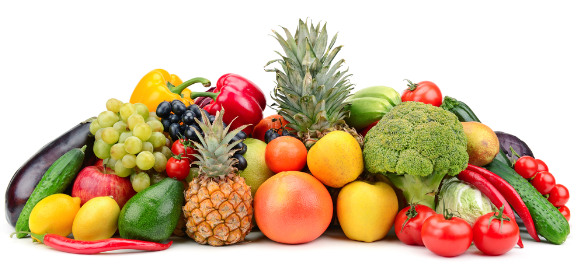Why is the diet important in gestational diabetes?
Most women with gestational diabetes can control their blood sugars just by making simple changes in their diet along with physical activity. Following your right meal plan can help you control your gestational diabetes, nourish your growing baby and keep you feeling good.
For some women, healthy eating and physical activity are not enough to control their blood sugars. If your blood sugars stay high, you may need to take insulin following your doctor’s prescription.
The medical nutritionist or dietician will help you make a plan for healthy eating.

How to meet the nutritional requirements?
You should meet the requirements of calories and nutrients (carbohydrate, protein, lipid, fibre) that are suitable with gestational diabetes as following:
| Body Mass Index (BMI) kg/m2 | Estimated calorie intake based on Pre-Pregnancy Weight (PPW) kcal/kg/day |
| Underweight (<19.8) | 36-40 |
| Normal weight (19.8-26) | 30 |
| Overweight (26.1-29) | 24 |
| Obese (>29) | 12-18 |
| Twin Gestation | Add an extra 500 kcal/day to the above recommendations |
- Adopted from National Academy of Sciences Institute of Medicine Guidelines for Pregnancy
- Protein: 12 – 20% of total energy intake
- Carbohydrate: 50 – 55% of total energy intake
- Lipid: 25 – < 30% of total energy intake
- Fibre: 20 – 35g/ day.
How to get all the nutrients I need in one day’s food while avoiding high blood sugar?
You should eat healthy and balance meals including 4 food groups: carbohydrates, proteins, lipids, vitamins and minerals as per following recommendations
CARBOHYDRATE FOODS
Carbohydrates are sources of energy found in a variety of foods. Most carbohydrates break down into sugar (glucose). You need to eat carbohydrates for good health and a healthy pregnancy. However, eating too much carbohydrate will raise your blood sugar.
You should eat enough low glycaemic index foods which less increase blood sugar, as:
- Wholegrain brown rice
- Fresh noodles
- Broken rice
- Whole beans
- Wholegrain cereals
- Wholegrain bread, etc.

You should limit foods that cause high blood sugar, as:
- White rice, white bread, potato, etc.
- Avoid soft drinks, fruit juice, sweetened drinks, etc.
- Limit desserts such as ice cream, pies, cakes, cookies, and so on.

Read labels carefully and check them for total carbohydrates per serving.
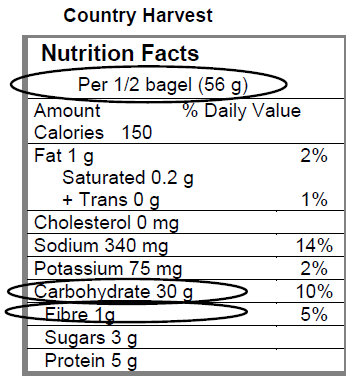
PROTEIN FOODS
- Fish, lean meat, beans, egg, milk are good sources of proteins.
FAT
- Be careful about fat, especially if you’re having excess weight
- Should use lean protein foods such as poultry, beef, pork, and fish. Limit lunchmeat, bacon, sausage, tallow, skin, viscera, butter, margarine, mayonnaise, cream cheese, etc.
- Should eat oily nuts, use vegetable oil in cooking food.

VEGETABLES
Should eat at least 500 g – 600 g green leafy vegetables/day. Should eat vegetables before main meals to limit high blood sugar after eating, as vegetables will provide fibres and prevent absorb carbohydrates.

FRUITS
Should choose less sweet fruits that low glycaemic index: about 200 g / day (such as melon, avocado, strawberry, dragon fruit, grapefruit, Vietnamese orange, Vietnamese tangerine, pear, apple, Vietnamese cherry, green kiwi, Vietnamese green grape, etc.). The fruit is used as a dessert after a meal, on average a serving of fruit from 50-100 g depending on the type of fruit sweeter or less sweet, can eat 2-3 servings a day. Fruit should eat the whole (fibre) to take advantage of the fibre, avoiding just squeezing juice. Note that for pregnant women, the blood glucose tends to be high in the morning, so should eat fruits in afternoon and or evening and avoid eating in the morning.

MILK AND DAIRY PRODUCTS
- It is a good source of energy, protein, calcium and some other micronutrients.
- Should use unsweetened and high calcium and skim or low-fat milk, unsweetened soy milk, unsweetened yogurt, cheese, etc.
- If a woman with gestational diabetic has a poor diet, malnutrition or low weight gain, she may consider supplement with specialized milk for diabetes with low glycaemic index (as prescribed by a doctor or nutritionist).
- Should avoid using special milk products for pregnant women as they may cause high blood sugar.
What other precautions to take for nutrition?
- Eat small, frequent meals and snacks. Eat about every 2 to 3 hours. Spreading your carbohydrates evenly throughout the day helps keep your blood glucose
- In every main meal and snack, include some healthy protein. This also helps even out your blood Moreover, protein helps you feel satisfied and full of energy throughout the day.
- In snacks, you should choose some low-glycaemic index foods such as unsweetened pasteurized milk, unsweetened yogurt, unsweetened soy milk, egg, cheese, vegetables roll with shrimp, meat, etc.
- When you have gestational diabetes, your blood glucose tends to be high in the morning. To offset this, your meal plan will probably include fewer carbohydrates at breakfast than at lunch or dinner. For example, your plan may specify a breakfast that includes one milk serving, one starch serving, and some protein. You should eat a very small breakfast, with a similar mid-morning snack about 2 hours later.
- Limit salty foods such as instant noodles, canned soup, fried potatoes, frozen foods, and packaged foods.
- Do not grind and stew starch food too much (such as porridge) because it is easy to get high blood sugar.
- Drink enough water (6-8 glasses a day).
- Eating on right time is very important for people with gestational diabetes.
CONCLUSION
Your plan will include:
- Avoiding foods that are high in sugar
- Eating smaller, more frequent meals
- Eating the suggested amount of carbohydrate in your meals and snacks.

If you have more questions or concerns about nutrition and diet, please call medical nutritionist, dietician or your doctor.
THE GLYCAEMIC INDEX (GI) OF FOODS
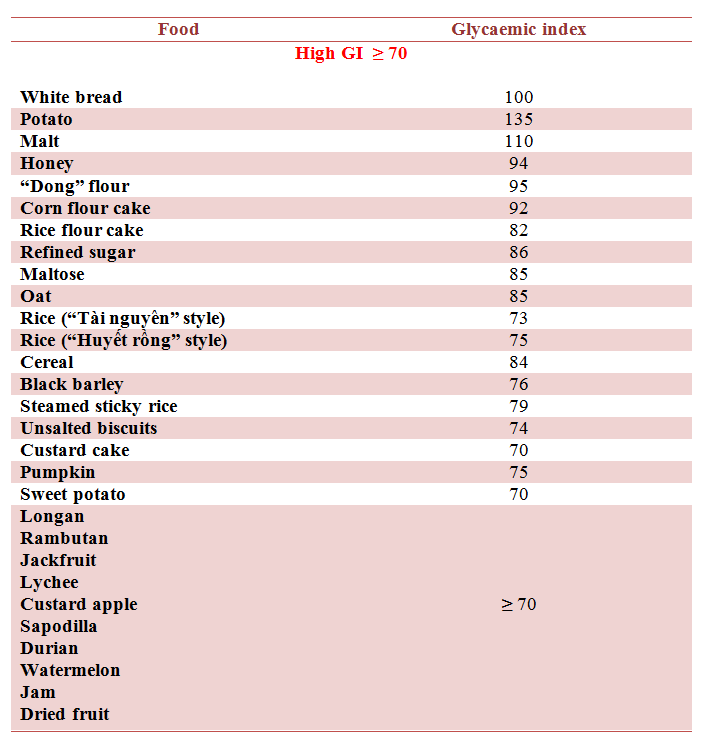
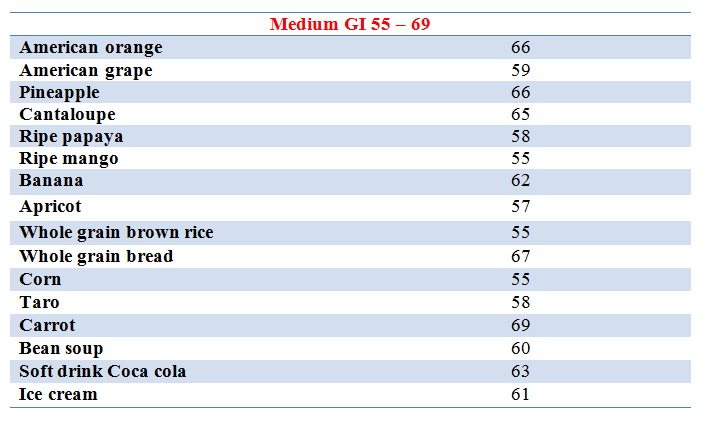
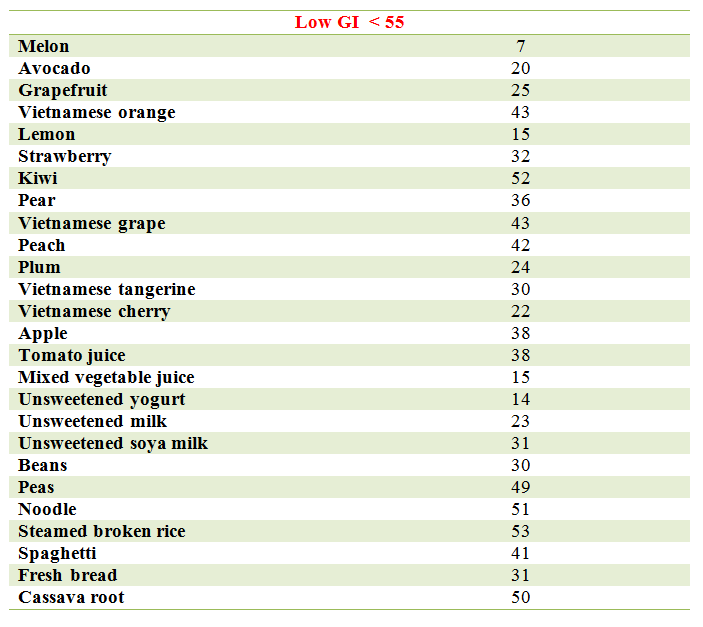
Example of menu 2200 kcal (protein: 20%, Lipid: 29%, carbohydrate: 51%)





